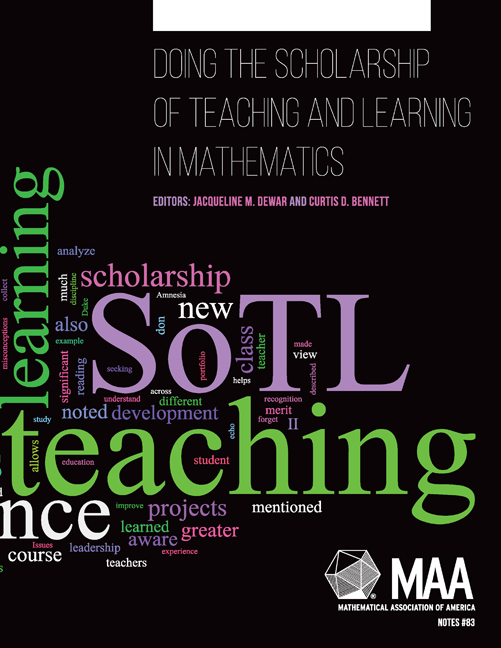Book contents
- Frontmatter
- Contents
- Foreword
- Preface
- Part I Getting Started in SoTL as a Mathematician
- Part II Illustrations of SoTL Work in Mathematics
- Theme 1: Experiments with Approaches to Teaching
- Theme 2: Crafting Learning Experiences around Real-World Data or Civic Engagement
- 10 Using SoTL to Assess the Outcomes of Teaching Statistics Through Civic Engagement
- 11 A Pedagogical Odyssey
- 12 Presenting Evidence for the Field That Invented the Randomized Clinical Trial
- Theme 3: Using Assigned Reading Questions to Explore Student Understanding
- Theme 4: Exploring Student Understanding of the Nature of Mathematics
- Theme 5: Tackling Large Questions
- Epilogue
- Index
10 - Using SoTL to Assess the Outcomes of Teaching Statistics Through Civic Engagement
from Theme 2: - Crafting Learning Experiences around Real-World Data or Civic Engagement
- Frontmatter
- Contents
- Foreword
- Preface
- Part I Getting Started in SoTL as a Mathematician
- Part II Illustrations of SoTL Work in Mathematics
- Theme 1: Experiments with Approaches to Teaching
- Theme 2: Crafting Learning Experiences around Real-World Data or Civic Engagement
- 10 Using SoTL to Assess the Outcomes of Teaching Statistics Through Civic Engagement
- 11 A Pedagogical Odyssey
- 12 Presenting Evidence for the Field That Invented the Randomized Clinical Trial
- Theme 3: Using Assigned Reading Questions to Explore Student Understanding
- Theme 4: Exploring Student Understanding of the Nature of Mathematics
- Theme 5: Tackling Large Questions
- Epilogue
- Index
Summary
Editors' Commentary
In this chapter Cindy Kaus discusses a SoTL project that grew out of her involvement with a national initiative to incorporate civic engagement into the teaching of science and mathematics. She called upon SoTL to provide assessment for the effectiveness of her course redesign. The chapter considers a common problem in doing SoTL, namely encountering difficulties in getting comparison data from control groups taught by other faculty members even when they are willing to assist. The author also describes the professional connections and benefits that accrued to her from employing SoTL to investigate student learning.
Introduction
The relationship between successful mathematics course completion and degree attainment in higher education is significant (Adelman, 2006, 2009). Hence, the low graduation rates in higher education institutions (Callan, 2008) indicate a need for a more effective and engaging mathematics curriculum. In addition, as more mathematically underprepared students enter higher education (Parsad & Lewis, 2003), engaging students and increasing retention rates in mathematics courses become greater challenges. Low completion rates in general education mathematics courses at Metropolitan State University, a comprehensive public university in St. Paul, Minnesota, led to an investigation of how civic engagement could be used in a statistics course to increase retention and students' interest and confidence in their ability to do mathematics.
Metropolitan State University is an urban institution serving the Twin Cities of Minnesota. The student population is the most diverse in the higher education system in Minnesota. Students of color make up 34% of its student body. The university was founded on principles of connecting higher education with surrounding communities. The idea to incorporate community-based projects into an introductory statistics course emerged as a result of the university's founding principles and also from attending the 2006 SENCER Summer Institute. SENCER, which stands for Science Education for New Civic Engagements and Responsibilities, is an NSF-funded curriculum and dissemination project. It aims to improve collegiate instruction in STEM fields by promoting the teaching of science and mathematics through complex, real world problems.
- Type
- Chapter
- Information
- Publisher: Mathematical Association of AmericaPrint publication year: 2014

